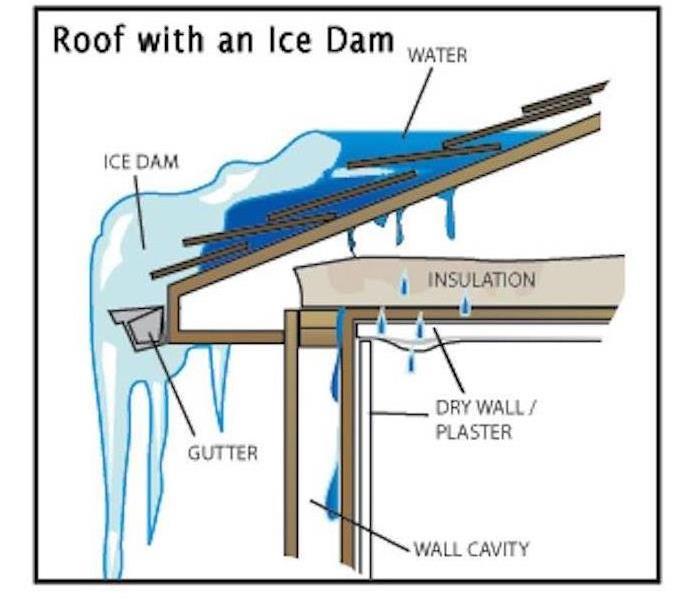Recent Water Damage Posts
Demo Day Requirements
4/19/2022 (Permalink)
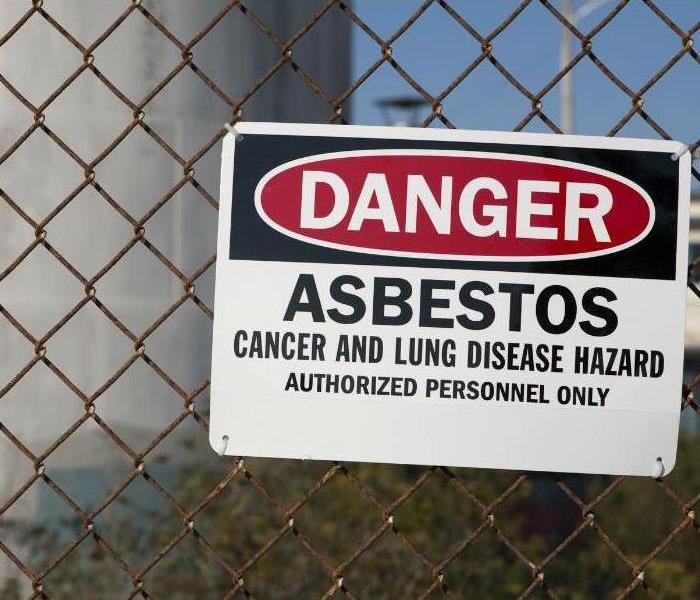 Asbestos Warning Sign
Asbestos Warning Sign
If you have ever watched an episode of just about any HGTV home renovation show, you know what I'm referring to when I say "Demo Day." In a water loss, demo work is a fairly typical part of drying out a home or business, especially if the water laden sheetrock has been sitting for any period of time.
New state requirements in New Hampshire require you test a sample of the materials you intend to demo for asbestos before performing the demo work, regardless of the age of the home.
Asbestos can be found in a number of building materials such as attic & wall insulation, vinyl floor tiles & tile adhesives, roofing & siding shingles, textured paint & patching compounds, etc...
According to the EPA, "Exposure to asbestos increases your risk of developing lung disease." Three of the major health effects associated with asbestos are:
- Lung Cancer
- Mesothelioma
- Asbestosis
Symptoms may take many years to develop following exposure. This is a truly a better safe than sorry situation. Better to pay the cost of testing now, than with health issues later in life.
The Building Performance Institute, Inc, has some good information about asbestos in the home. Here's the link: https://www.bpihomeowner.org/blog/things-you-should-know-asbestos-use-still-legal
Tankless Water Heaters vs Storage Tank Water Heaters
11/22/2021 (Permalink)
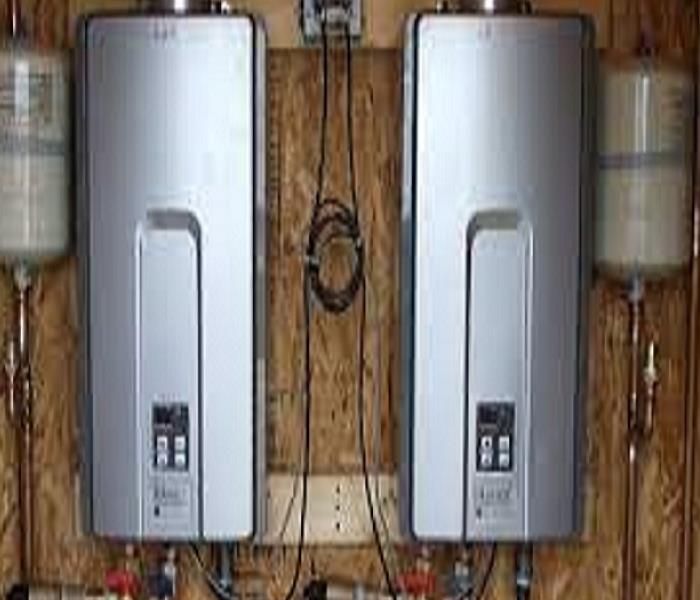 Tankless Water Heater
Tankless Water Heater
Tankless Water Heaters are becoming the favored replacement for a failed Storage Tank Water Heater, and for several good reasons. Tankless water heaters provide, on average, about 2-5 gals per minute of hot water, less than most storage tank water heaters. However, storage tank water heaters have a set storage capacity, unlike a tankless water heater.
Tankless water heaters take up much less space and can be easily placed on a wall, providing more overall storage room.
Both tankless and storage tank water heaters should be checked regularly for mineral build-up to prevent scaling, thereby impairing the water heater's function. A tankless water heater has a filter that can be cleaned/changed, providing for much less maintenance than a storage tank water heater that needs to be shut down and drained, possibly moving sediment and mineral build-up around, causing unforeseen issues until a problem occurs.
How does a tankless water heater work? As water travels through the Unit, it is heated by a gas burner or electric heating coil, heating the water instantly.
A typical storage tank water heater for a family of 5 is about 40-50 gallons. If the tank fails, and you aren't home to shut the water supply off, that's 40-50 gallons of water on your floor, not counting the fact that the water is still on, trying to fill the tank as it drains out its contents.
While a tankless water heater doesn't have a storage tank, the supply lines running through the tankless system can still fail, so proper, consistent maintenance is still required to help prevent failures.
While SERVPRO of Derry/Londonderry is not a plumbing service company, we see plenty of storage tank water heater failures and the damage caused by them. Tankless water heaters have their problems, but look to be the way of the future, more efficient, more capacity, albeit at a higher cost, and with a reduced failure rate.
How does a Tankless Water Heater work?
Cold Weather Is On Its Way...
9/30/2021 (Permalink)
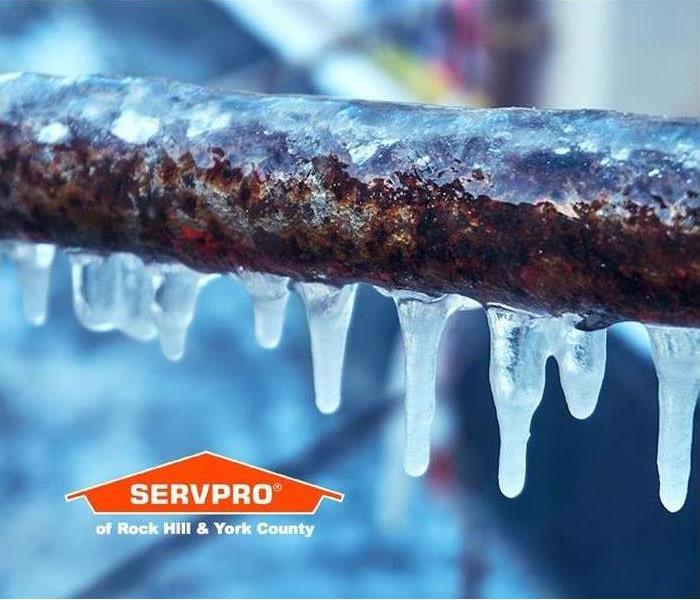 Frozen Pipe
Frozen Pipe
Fall is officially here. Leaf Peepers are headed up to NH for the beautiful colors and the nights are getting colder. The Mt Washington Observatory recognized their first snowfall of the year on the peak this past Wed, Sept 29th. Apple season is in full swing as the NH orchards are now open for apple picking, hot cider and homemade cider donuts. While you are enjoying all NH has to offer this Fall, don’t forget to prepare for the cold that the late Fall and Winter seasons bring along with them. That means draining your outside hoses and putting them in storage, shutting off your outside spigot/faucet valves, inside and out, installing your insulated faucet cover(s), cleaning out your gutters and making sure your gutter protection device is secure and free of debris, and insulating any exposed water supply lines. Don’t know or aren’t sure where your water supply line shut-off valves are? SERVPRO of Derry/Londonderry can label all of your water supply line shut-off’s for you, free of charge. Call Chuck at 856.495.4369 or email chuck@SERVPROderrylondonderry.com to schedule.
Leak Detection
3/1/2021 (Permalink)
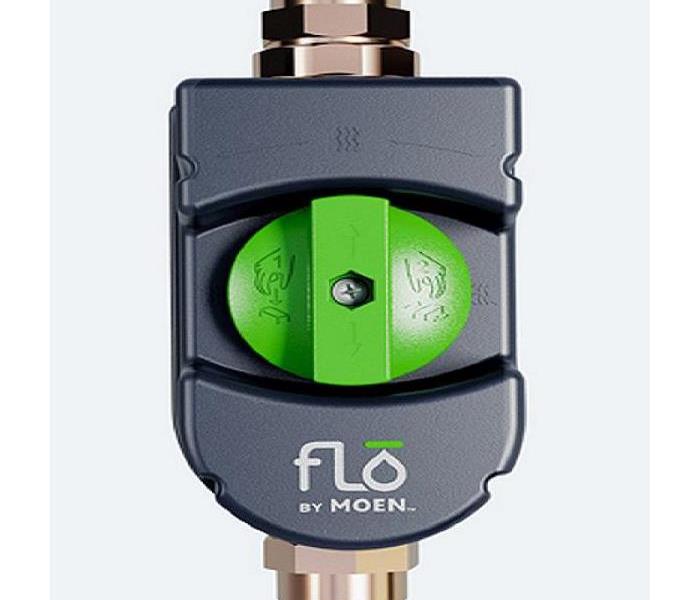 Flo by Moen Smart Water Shut-Off
Flo by Moen Smart Water Shut-Off
Headed out for vacation, the weekend, or maybe just for the night? Consider this, a 3/4" pipe with average water pressure in the home at 60-80 psi will disperse approximately 23 gals per minute. There are a number of variables (ie: toilet supply line, water heater, sink supply line, main supply line, etc...). Regardless, if you are out of the house for an extended period of time and experience a pipe burst, you will have some clean up to do when you get home.
One way to help stop the flow of water is by installing a smart water shut-off system. There are several on the market, one of them being the Flo by Moen.
The smart water shut-off's monitor the flow and pressure of the water in your home, detecting irregularities, and if configured, can perform an automatic shut-off of your system.
If you have ever experienced a water loss, then you can definitely see the advantages to a smart water shut-off system. If you haven't, contact me for more details. The costs are surprisingly modest, especially compared to the cost of water mitigation, clean-up and drying when a water loss event occurs.
chuck@SERVPROderrylondonderry.com
Category 2: Gray Water
1/25/2021 (Permalink)
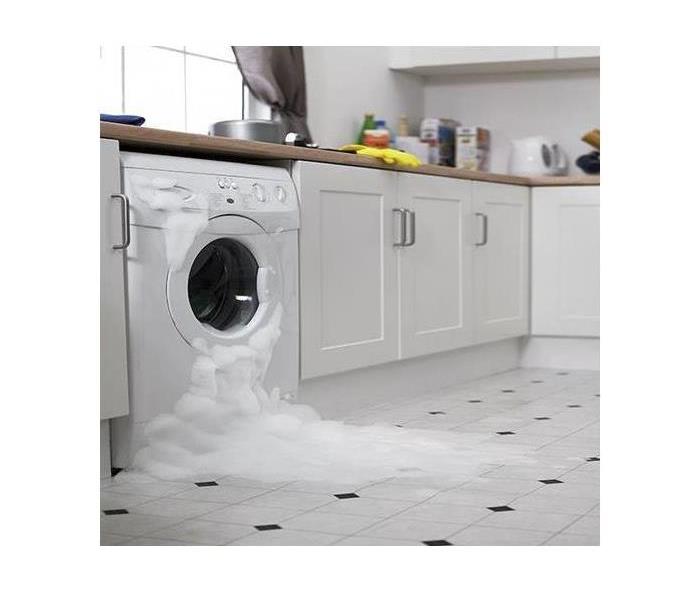 Washing Machine Overflow: Category 2 Water
Washing Machine Overflow: Category 2 Water
The categories of water refer to the range of contamination in water, considering both its originating source and quality after it contacts materials present on the job site. Time and temperature can affect or retard the amplification of contaminants, thereby affecting its category.
Defined as the presence of undesired substances; the identity, location and quantity of which are not reflective of a normal indoor environment; and can produce adverse health effects, cause damage to structure and contents or adversely affect the operation or function of building systems.
Category 2 water contains significant contamination and has the potential to cause discomfort or sickness if contacted or consumed. Category 2 water can contain potentially unsafe levels of microorganisms or nutrients for microorganisms, as well as other organic or inorganic matter (chemical or biological). Examples of category 2 water can include discharge from dishwashers or washing machines; overflows from washing machines; overflows from toilet bowls on the room side of the trap with some urine but no feces; seepage due to hydrostatic pressure; broken aquariums and punctured water beds.
Category 2 water can deteriorate to Category 3. Once microorganisms become wet from the water intrusion, depending upon the length of time that they remain wet and the temperature, they can begin to grow in numbers and can change the category of the water.
The information noted above comes directly from the IICRC S500 Standards for Professional Water Damage Restoration.
Is All Water The Same?
10/20/2020 (Permalink)
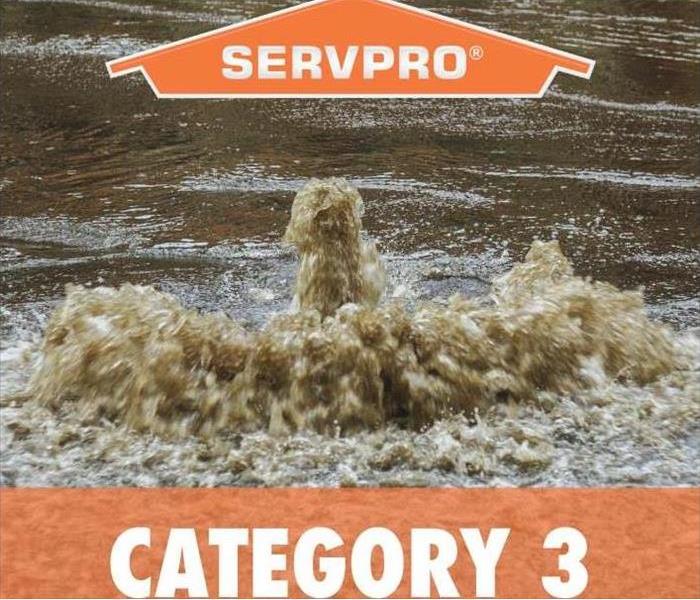 Category 3 Water
Category 3 Water
In the mitigation industry, water is classified in three different ways: Category 1: Clean Water; Category 2: Gray Water; & Category 3: Black Water.
Category 1 Water refers to a source of water that does not pose a substantial threat to humans and is classified as "Clean Water." Examples would be water from a burst water supply line, malfunctioning dishwasher, etc...
Category 2 Water is known as Gray Water and contains some type of contaminant. Examples would be discharge from dishwashers, broken aquarium or overflow from a toilet with urine, but no feces.
Category 3 Water is known as Black Water and contains contaminants and considered unsanitary. Examples would be sewage back-up, toilet overflow with feces, etc...
The categories are important as they determine the level of clean-up and mitigation. A carpet that got wet from Category 1 Water can be dried, cleaned up and reinstalled. That same carpet that is wet from Category 3 Water must be disposed of due to the contaminants and the health hazards Category 3 water presents.
SERVPRO of Derry/Londonderry are experts in the water mitigation industry and are open 24/7/365 to serve you. We'll make it "Like it never even happened."
Category 1: Clean Water
10/20/2020 (Permalink)
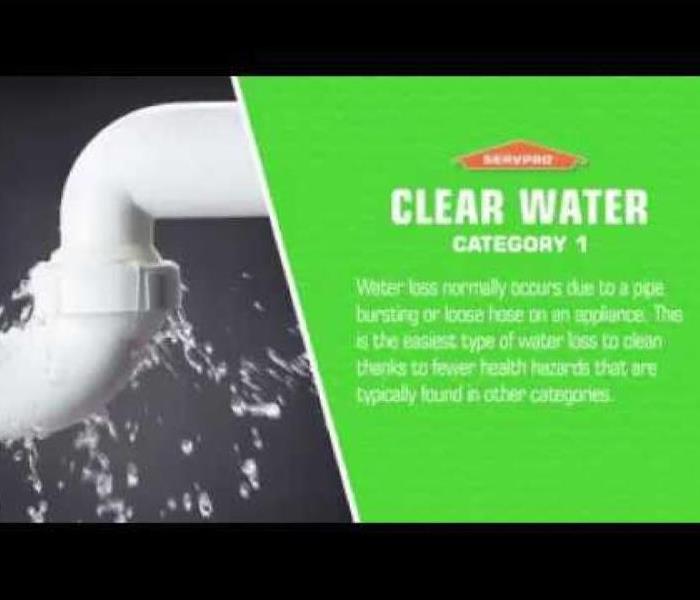 Category 1 Water
Category 1 Water
In our Oct 2020 Blog, "Is All Water The Same," we describe the 3 Categories of water that define a water loss and dictate how we mitigate and clean-up this water. This blog article focuses on Category 1 Water.
Water Classes are determined by how much water is present and the type of material that is absorbing the water. In simplified terms, water classes are arranged by the difficulty and time needed to dry out an area.
Category 1 Water, aka Clean Water, is from a source that poses no substantial harm to people. Likely sources of Category 1 Water would be overflow of bath water, a leaky supply line from an Ice Maker, Washer or Dishwasher, and does not migrate into a contaminated area.
Clean-up typically consists of extraction of the water, evaporation with the use of air-movers and dehumidifier's to remove the moisture from the air.
Carpets and other wet items can usually be saved through the drying process.
If the water loss occurred 48 hours prior and has not yet been mitigated, cleaned-up and dried out, this water loss can now become a Category 2 Water Loss.
Stay tuned for the next Blog Post "Category 2: Gray Water."
What It Means to be IICRC Certified
2/27/2020 (Permalink)
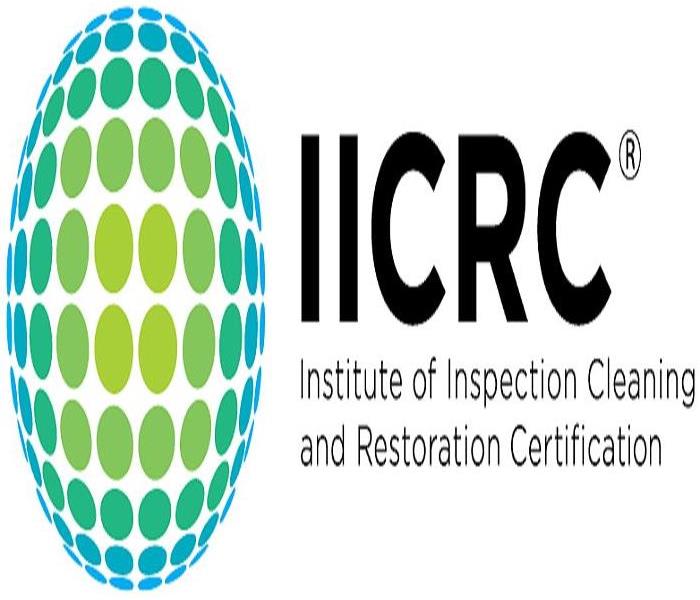 IICRC
IICRC
What is the IICRC Organization?
The IICRC is the Institute of Inspection Cleaning and Restoration Certification, a non-profit organization for the cleaning and restoration industry. Since starting in 1972, the IICRC has evolved into a global organization with more than 60,000 active Certified Technicians and more than 6,000 Certified Firms around the world.
The IICRC is managed by its Board of Directors, which is comprised of 15 industry leaders elected by the IICRC’s Shareholders. The Board of Directors’ function is to represent the various interests of the Registrants while leading the direction of the organization. The Board of Directors is tasked with the responsibility of helping shape future policies of the organization and uphold the standards that help shape the industry.
The mission of the IICRC is to establish and advance globally recognized standards and certifications for the inspection, cleaning, restoration and installation industries.
Respect – We will treat everyone we encounter in our interactions through the IICRC in the same manner we would wish to be treated.
Responsible – We will work to assure that the obligations and stated goals of the IICRC are met in a timely fashion.
Integrity - We will establish and maintain a culture characterized by honesty, high values and exceptional standards of conduct.
Excellence – We will accept nothing less than the best in leadership, quality and service.
Expert – We will continue to build the IICRC’s reputation as the leading authority and source of professional knowledge in the industry.
The IICRC Standards are the most comprehensive and advanced technical information in the industry.
Where professionals find training and consumers find peace of mind.
SERVPRO of Derry/Londonderry is a proud, IICRC Certified member.
Resource: IICRC
Baby It's Cold Outside...
11/14/2019 (Permalink)
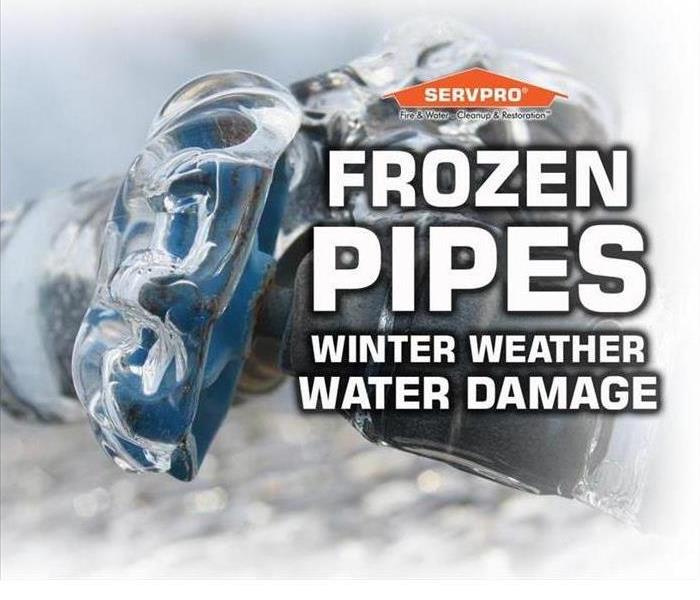 Frozen Cracked Pipe
Frozen Cracked Pipe
"A November Arctic Blast" is how the National Weather Service is describing the record low temps the Northeast will be experiencing these next couple of days.
When the New England region is subjected to this level of cold weather, SERVPRO of Derry/Londonderry knows what is coming next - frozen pipes. Frozen pipes that burst can cause serious water damage to a home or business.
Have you prepared your home or business for the winter weather? Water damage is the cause of many problems, the least of which is the mitigation and clean-up that SERVPRO provides. It's the disruption to your life or business, the time off from work to manage this crisis or the realignment of personnel, the damage done to personal possessions, furnishings, and business records, the shutting down of a line in a manufacturer or distributor, the relocation and costs associated with relocation, to name a few.
Preventing disasters such as these is not always possible, but being prepared to tackle them quickly in order to mitigate your loss is. Message me for details to find out how SERVPRO can help you be prepared.
Call 811 Before You Dig
5/16/2019 (Permalink)
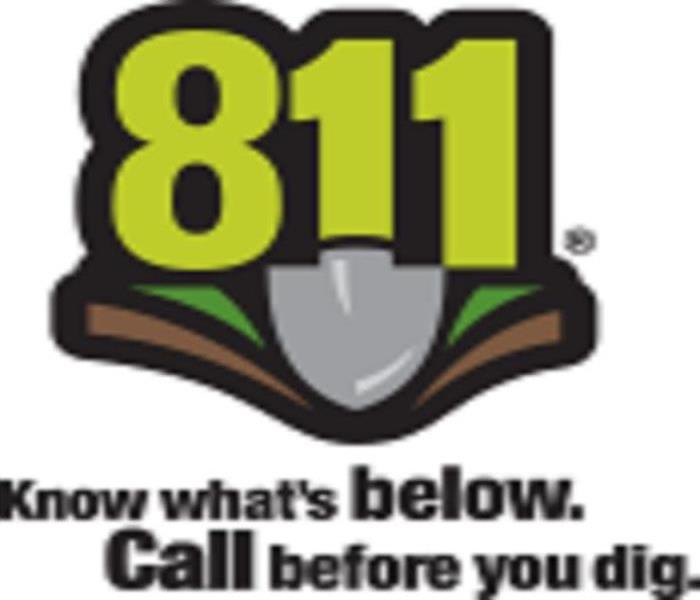 Call 811 Before You Dig
Call 811 Before You Dig
We've all seen or heard the commercials for 811, "Call Before You Dig," especially pre-spring and early spring when homeowners and landscapers are preparing to rip out plants, cut trees, pull out stumps, plant new foliage, till up your garden, dig footers for the new deck or gazebo, etc...
Why call 811? To prevent damage to underground utility lines and cables. If you damage them, you pay the expense to repair them. Besides the cost of repairs, you risk causing damage to your home should you crack a water, sewer or gas line.
Each Utility comes with its own color scheme (ie: water lines are blue, electric is red, pressurized gas is yellow, cable TV is orange, and so on.
New Hampshire Public Utilities Commission, Safety Division, has a great handbook readily available for download called "New Hampshire Excavator Manual." Contact chuck@SERVPROderrylondonderry.com and I will send you the pdf version.
April Showers...
4/1/2019 (Permalink)
"April showers bring May flowers" is a reminder that an unpleasant weather event can bring about beauty. While this is certainly the case, April showers can also bring about the unpleasant realities of home ownership such as water in your basement.
Water seepage can be brought about by a number of factors including improper grading around your home, overgrown plants with extending root systems, improperly pitched gutters, downspouts that are directing the water back to the home, clogged gutters, and the most difficult factor to correct, high water table.
These issues offer you lots of weekend opportunities to get out there and work on your home and yard. Should you need an expert to come in and dry up your basement before you get a chance to make these corrections, we're here to help.
SERVPRO of Derry/Londonderry is on the clock 24/7/365 for all of your emergent needs. We will make it "Like it never even happened."
Do You Know Where Your Water Shutoff Valve Is?
1/29/2018 (Permalink)
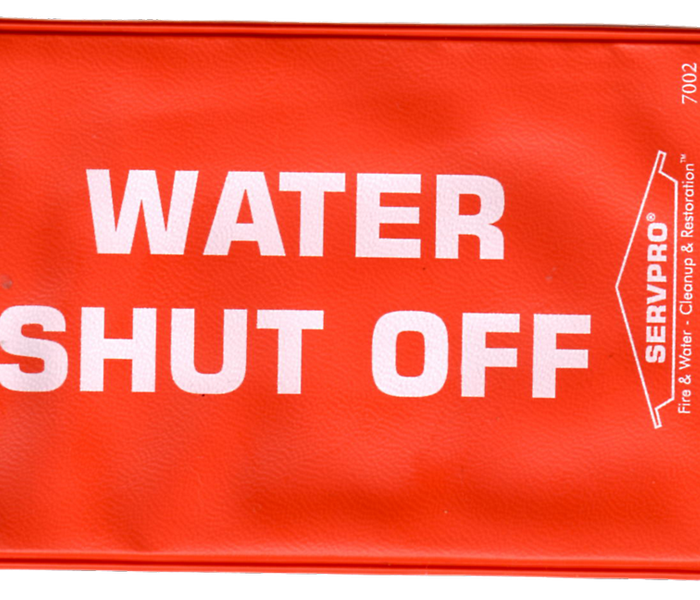 Label your Water Shut off Valve(s)
Label your Water Shut off Valve(s)
Do you and your family know where the main water shutoff valve is located in your house? It is always harder to find something when in a panic. That is why we highly recommend that you be aware of its location before a disaster strikes.
”Where It Is Not: It is likely not under a sink. The shut-off to the water heater may look promising, but that only affects the outflow of hot water from that point. Do not confuse the gas shut-off to the furnace or water heater with water lines.”
“Check Your Inspection Report: If you still have your property inspection report from when you purchased the house, it should indicate the location of the shut-off valve. Inspection reports often follow a standardized format, so you may find this information located in Section 6.1.”
Follow the link for more helpful tips to help you locate the shutoff valve in your home.
Knowing where the water shut off is critical when you have a burst pipe. The faster you are able to turn off the water, the less damage your home will suffer. Call SERVPRO Derry Londonderry at 603-432-3221 as soon as you are able and our technicians can help get your home back to it's original condition. We are here when you need us !!!
ICE DAMS
1/2/2018 (Permalink)
An Ice Dam is a hump of ice that forms at the edge of a roof under certain wintertime conditions. An ice dam can damage both your roof and the inside of your home. It will put gutters and downspouts at risk too.
Ice Dams are a common sight in Northern New England winters. There are several things you can do to avoid getting an ice dam or to reduce the risk of damage after one has formed, but there’s really only one cure: a combination of better sealing, insulation, and venting in the attic and eaves.
HOW DO ICE DAMS FORM?
An ice dam forms when the roof over the attic gets warm enough to melt the underside of the layer of snow on the roof. The water trickles down between the layer of snow and the shingles until it reaches the eave of the roof, which stays cold because it extends beyond the side of the house. There, the water freezes, gradually growing into a mound of ice.
The flatter the pitch of the roof, the easier it is for an ice dam to get a grip. Gutters at the eaves can also trap snow and ice. If snow and ice build up high enough in the gutter, it can provide a foundation for an ice dam.
WHAT DAMAGE DO ICE DAMS CAUSE?
When an ice dam gets big enough, melted water backs up behind it and seeps underneath the shingles. Eventually, it will drip into the insulation and down into the ceilings and exterior walls beneath the eave, ruining sheetrock and paint. If the ice dam breaks free, it can pull shingles and gutters off with it, and it will damage anything it falls on: shrubs, windowsills, cars, pets, and people. If the roof sheathing stays wet, it can form mildew and start to rot
DEALING WITH EXISTING ICE DAMS
1. Remove the ice dam by breaking it free in small chucks. Do NOT use an ax or other sharp tool! You’ll cut through the shingles. Instead, tap lightly with a blunt mallet. This is slow, dangerous work, so hire someone experienced at roofing. Even if you do it safely, the chunks of ice can take pieces of shingle with them.
2. Clear out gutters and downspouts. Again, this is ladder work and an easy way to damage either plastic or metal gutters and spouts.
3. Melt troughs through the ice dam with calcium chloride ice melter. Do NOT use rock salt! It will damage paint, metals, and plants beneath the eave and wherever the salty water drains.
A good trough-maker is a tube of cloth (a leg from an old pair of panty hose works well). Fill it with calcium chloride, tie off the top, and lay it vertically across the ice dam. It will slowly melt its way down through the dam, clearing a path for the underlying water to flow free.
Call SERVPRO of Derry Londonderry at 603-432-3221. We’ll make it “Like it never even happened.”
Faster to your Water Damage Event
11/30/2017 (Permalink)
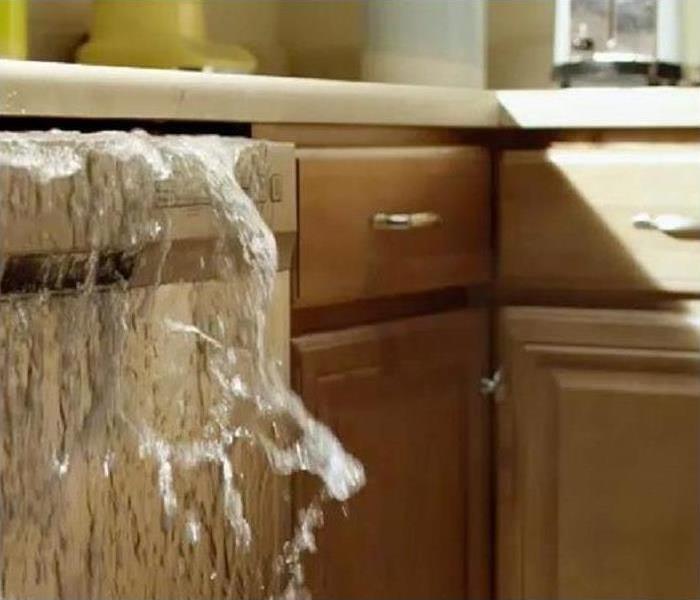 SERVPRO of Derry Londonderry provides 24 hour fire and water damage restoration service to any size event.
SERVPRO of Derry Londonderry provides 24 hour fire and water damage restoration service to any size event.
Flooding and water emergencies don’t wait for regular business hours and neither do we. SERVPRO of Derry Londonderry provides emergency cleaning and restoration services 24 hours a day, 7 days a week—including ALL holidays.
Faster To Any Size Disaster
Flooding and water damage is very invasive. Water quickly spreads throughout your home and gets absorbed into floors, walls, furniture, and more. SERVPRO of Derry Londonderry arrives quickly and starts the water extraction process almost immediately. This immediate response helps to minimize the damage and the cleaning and restoration costs.
Need Emergency Service? Call Us 24/7 – 603-432-3221
Water Damage Timeline
Within Minutes
- Water quickly spreads throughout your property, saturating everything in its path.
- Water is absorbed into walls, floors, upholstery, and belongings.
- Furniture finishes may bleed, causing permanent staining on carpets.
- Photographs, books, and other paper goods start to swell and warp.
Hours 1 - 24:
- Drywall begins to swell and break down.
- Metal surfaces begin to tarnish.
- Furniture begins to swell and crack.
- Dyes and inks from cloth and paper goods spread and stain.
- A musty odor appears.
48 Hours to 1 Week:
- Mold and mildew may grow and spread.
- Doors, windows, and studs swell and warp.
- Metal begins to rust and corrode.
- Furniture warps and shows signs of mold.
- Paint begins to blister.
- Wood flooring swells and warps.
- Serious biohazard contamination is possible.
More Than 1 Week:
- Restoration time and cost increase dramatically; replacing contaminated materials and structural rebuilding may be extensive.
- Structural safety, mold growth, and biohazard contaminants pose serious risks to occupants.
About SERVPRO of Derry Londonderry
SERVPRO of Derry Londonderry specializes in the cleanup and restoration of residential and commercial property after a fire, smoke or water damage event. Our staff is highly trained in property damage restoration. From initial and ongoing training at SERVPRO’s corporate training facility to regular IICRC-industry certification, rest assured our staff is equipped with the knowledge to restore your property.
Derry 24 Hour Emergency Water Damage Service
12/8/2016 (Permalink)
SERVPRO of Derry/Londonderry is available 24 hours a day for water emergencies, large or small. When you are dealing with water damage, immediate action is crucial. A delay of just a few hours can greatly increase the severity of the water damage.
Our franchise is located in Derry, with close proximity for immediate services to the surrounding areas. Which means we can provide prompt services in case of a water emergency. Any content affected by the water can be damaged, which is one of the many reasons we provide immediate response.
Water loss is severe and can be quite traumatic, which is why we can provide you with great customer service and assure you we will get the job done, giving you peace of mind.
We are here to make it look "Like It Never Even Happened".

 24/7 Emergency Service
24/7 Emergency Service











